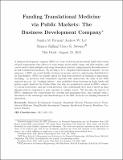Funding Translational Medicine via Public Markets: The Business Development Company
Author(s)
Forman, Sandra M.; Shilling, Monica; Sweeney, Grace K.; Lo, Andrew W
DownloadLo_Funding translational medicine.pdf (397.7Kb)
OPEN_ACCESS_POLICY
Open Access Policy
Creative Commons Attribution-Noncommercial-Share Alike
Terms of use
Metadata
Show full item recordAbstract
A business development company (BDC) is a type of closed-end investment fund with certain relaxed requirements that allow it to raise money in the public equity and debt markets, and can be used to fund multiple early-stage biomedical ventures, using financial diversification to de-risk translational medicine. By electing to be a “Regulated Investment Company” for tax purposes, a BDC can avoid double taxation on income and net capital gains distributed to its shareholders. BDCs are ideally suited for long-term investors in biomedical innovation, including: (i) investors with biomedical expertise who understand the risks of the FDA approval process, (ii) “banking entities,” now prohibited from investing in hedge funds and private equity funds by the Volcker Rule, but who are permitted to invest in BDCs, subject to certain restrictions, and (iii) retail investors, who traditionally have had to invest in large pharmaceutical companies to gain exposure to similar assets. We describe the history of BDCs, summarize the requirements for creating and managing them, and conclude with a discussion of the advantages and disadvantages of the BDC structure for funding biomedical innovation
Date issued
2015-12Department
MIT Laboratory for Financial Engineering; Sloan School of ManagementJournal
Journal of Investment Management
Publisher
Journal of Investment Management
Citation
Forman, Sandra M.; Lo, Andrew W.; Shilling, Monica and Sweeney, Grace K. "Funding Translational Medicine via Public Markets: The Business Development Company." Journal of Investment Management 13, no. 4 (December 2015)
Version: Author's final manuscript
ISSN
1545-9144
1545-9152